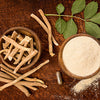Home Remedies for Indigestion: 12 Ways to Relieve Heartburn

Indigestion, often accompanied by heartburn, is a common ailment that can cause discomfort and disrupt daily life. Whether it's triggered by certain foods, stress, or lifestyle factors, finding relief from indigestion is a top priority for many. While over-the-counter medications can provide quick relief, natural remedies offer gentler alternatives that can ease symptoms without unwanted side effects.
In this article, we'll explore a variety of home remedies for indigestion and heartburn, providing you with 12 effective ways to find relief and soothe your stomach.
What are the Symptoms of Indigestion?
Indigestion, also known as dyspepsia, manifests as a range of symptoms that can vary in severity and duration. Common symptoms of indigestion include a burning sensation or discomfort in the upper abdomen or chest, bloating, gas, nausea, and belching.
Heartburn, characterized by a burning sensation in the chest or throat, is a hallmark symptom of acid reflux, a common cause of indigestion. While occasional indigestion is normal, frequent or persistent symptoms may indicate underlying gastrointestinal issues, such as gastroesophageal reflux disease (GERD) or peptic ulcers, and should be evaluated by a healthcare professional.
Treating Indigestion at Home
1. Over-the-Counter Antacids: Quick Relief
Over-the-counter antacids, such as Tums or Rolaids, are commonly used to provide quick relief from heartburn and indigestion. These medications work by neutralizing stomach acid to alleviate symptoms. Antacids are available in various forms, including tablets, chewable tablets, and liquids, and can be taken as needed to relieve discomfort.
However, it's essential to use antacids as directed and consult a healthcare professional if symptoms persist or worsen.
Natural Remedies for Indigestion Relief
2. Peppermint Tea
Peppermint tea is a popular natural remedy for indigestion due to its calming and soothing properties. Peppermint contains menthol, which helps to relax the muscles of the digestive tract and relieve symptoms of indigestion, including gas and bloating. Enjoy a warm cup of peppermint tea after meals or whenever you experience discomfort to ease digestive distress.
3. Chamomile Tea
Chamomile tea is another herbal remedy that can help soothe indigestion and promote relaxation. Chamomile contains compounds that have anti-inflammatory and antispasmodic effects, which can help reduce stomach cramps and discomfort. Sip on a cup of chamomile tea between meals or before bedtime to ease indigestion and promote overall digestive health.
4. Apple Cider Vinegar
Despite its acidic nature, apple cider vinegar is believed to help relieve indigestion by neutralizing stomach acid and improving digestion. Mix one to two tablespoons of apple cider vinegar with a glass of water and drink it before meals to aid digestion and prevent heartburn. However, it's essential to dilute apple cider vinegar properly to avoid irritation of the esophagus and stomach lining.
5. Ginger
Ginger has long been used as a natural remedy for digestive issues, including indigestion and nausea. Ginger contains compounds called gingerols and shogaols, which have anti-inflammatory and anti-nausea properties that can help alleviate symptoms of indigestion. Enjoy ginger tea, chew on crystallized ginger, or add fresh ginger to your meals to reap its digestive benefits.
6. Aloe Vera Juice
Aloe vera juice is renowned for its soothing and healing properties, making it a popular remedy for indigestion and heartburn. Drinking aloe vera juice may help reduce inflammation in the digestive tract and provide relief from symptoms such as burning sensations and stomach upset. However, it's essential to choose aloe vera juice that is free of added sugars and other additives to maximize its benefits.
7. Fennel Seed
Fennel seeds have been used for centuries as a natural remedy for indigestion, bloating, and gas. Fennel contains compounds that help relax the muscles of the digestive tract and alleviate symptoms of indigestion. Chew on a teaspoon of fennel seeds after meals or brew fennel seed tea to ease digestive discomfort and promote healthy digestion.
8. Baking Soda
Baking soda, or sodium bicarbonate, is a well-known home remedy for indigestion due to its ability to neutralize stomach acid. Mix a teaspoon of baking soda with a glass of water and drink it to help alleviate symptoms of heartburn and indigestion. However, it's essential to use baking soda sparingly, as consuming too much can lead to electrolyte imbalances and other health issues.
9. Lemon Water
Lemon water is believed to aid digestion and relieve indigestion due to its acidic nature and vitamin C content. Squeeze the juice of half a lemon into a glass of warm water and drink it before meals to stimulate digestive juices and promote healthy digestion. Additionally, lemon water can help hydrate the body and support overall health and well-being.
10. Licorice Root
Licorice root has been used for centuries in traditional medicine to treat a variety of ailments, including indigestion and heartburn. Licorice contains compounds that help protect the stomach lining and reduce inflammation, making it an effective remedy for soothing digestive discomfort.
Enjoy licorice root tea or take licorice root supplements as directed to relieve indigestion and support gastrointestinal health.
How to Get Rid of Indigestion at Night
11. Elevate Your Upper Body
Elevating your upper body while sleeping can help reduce symptoms of indigestion, such as heartburn and acid reflux. Use extra pillows to prop yourself up or invest in a wedge-shaped pillow designed to elevate the upper body and prevent stomach acid from flowing back into the esophagus. Sleeping on your left side may also help alleviate indigestion by promoting better digestion and reducing pressure on the stomach.
12. Take a Warm Bath or Apply a Warm Compress
Taking a warm bath or applying a warm compress to your abdomen before bedtime can help relax the muscles of the digestive tract and soothe indigestion symptoms. The warmth can promote blood circulation and alleviate discomfort, making it easier to fall asleep and stay asleep throughout the night.
Relax in a warm bath for 15-20 minutes or place a warm compress on your abdomen for similar effects.
When to See a Doctor for Indigestion
While occasional indigestion is common and usually harmless, persistent or severe symptoms may indicate an underlying digestive disorder that requires medical attention. Consult your doctor if you experience frequent or recurrent indigestion, symptoms that worsen over time, difficulty swallowing, unintentional weight loss, or signs of gastrointestinal bleeding, such as black or tarry stools.
Your doctor can perform diagnostic tests to determine the cause of your indigestion and recommend appropriate treatment options.
Conclusion
Indigestion and heartburn can be uncomfortable and disruptive, but many effective home remedies can provide relief without the need for medication. By incorporating these natural remedies into your daily routine and making lifestyle modifications to support digestive health, you can alleviate symptoms of indigestion and enjoy greater comfort and well-being. However, if symptoms persist or worsen, it's essential





